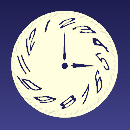

In case you're not sure who I am, I am a student at the University of Auckland in Auckland, New Zealand; I'm studying a BSc in Computer Science and Maths. I'm 19, female, and living in an apartment with another flatmate, who is normal, and who I do not know very well or see very often.
My initial introduction was brief: I had no official diagnosis of a CRD, was reasonably certain that I had one, and was about to attempt to fix it on my own.
My attempt to fix myself went out the window within a couple of days. I was able to chronotherapy my way around to 9am wake times; however, my body would immediately start shifting itself back to sleeping in the early morning and waking in the afternoon, sometimes in massive six hour jumps of sleep/wake time. The first couple of weeks of my sleep chart looked concerningly like non-24, because of this.
A few days after I introduced myself to the niteowl community, I saw my GP at the University of Auckland's student health centre (which is subsidised by the government to be free for students). The health centre is made up of two halves, one for general practise, and the other for counselling. Because my financial situation gives me no means of paying for a sleep specialist, my GP recommended me to a clinical psychologist at unihealth who has had some experience with sleep disorders of this type.
After a couple of sessions, my psychologist officially diagnosed me with DSPS (giant W00T here!). I decided that I would stop trying to fight the disorder. Waking in the morning is painful. Sleeping at night when I am not tired is painful. It is an extremely difficult fight which I have a history of losing, and I do not see the need to suffer for it.
The good news is, a CRD counts as a disability at my university (and likely throughout the country). What this boils down to is that my GP and my psychologist have both signed off saying that I have a disorder which makes it impossible for me to wake up in the morning to attend class or exams, and so I don't have to anymore. I've so far successfully had one morning exam shifted to the afternoon in order for me to be able to sit it.
Currently I am falling asleep between 04:00 and 05:00, and waking up
to an alarm at 12:00, although, as classes are finished for summer
school, I've lately been making the conscious, yes, let me repeat
that, conscious, decision to sleep in.
I'm fortunate in a lot of respects, and I don't mean just because my university is making allowances for me to sleep! I have caught this young, so it has not done too much damage to me. I have an extremely solid ability to sleep when tired, so if another person wakes me up early in the morning, I am able to sleep earlier the next night to catch up, and if I'm sleep deprived, I will simply sleep through any attempts to wake me. This has meant that while I've been very sleepy during the day for the last 3 years, I haven't suffered the ill effects of sleep deprivation. My sleep disorder does not coincide with any other major health or psychological issues, and so, life is looking good.
What I think has hit me most about the past month of natural sleeping is how different I feel both when I wake and throughout the day. When my alarm wakes me, I wake up. I am fully awake - alert, and even cheerful. I no longer wander to class in a sleepy haze. I no longer doze off in class despite the cup of coffee in my hand. I no longer take afternoon naps when I get home. I don't always like having to get out of bed, when it's all warm and soft inside, but I no longer experience an all consuming NEED to remain asleep. If I assume that this is how normal people feel when they wake up at 6, 7, 8 in the morning, then I start to understand what they've said to me all these years: "Nobody likes to get up in the morning, but we all just do it anyway." This is infinitely more possible now. :)
My sleep tracker, for the interested: http://www.medhelp.org/user_trackers/show/386257.